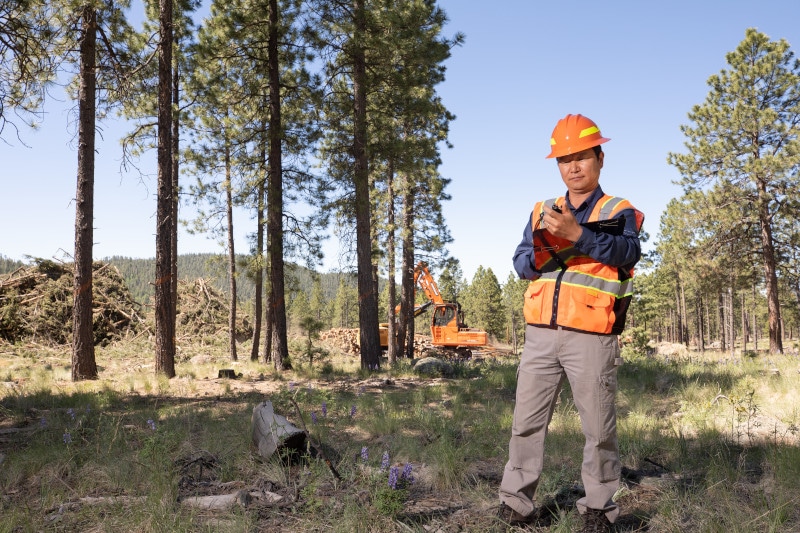A new program from Northern Arizona University aims to increase forest health and contribute to a growing resilient economy in Coconino County in one fell swoop.
Han-Sup Han, a professor of forestry and director of forest operations and biomass utilization at the Ecological Restoration Institute (ERI) at NAU, is the principal investigator on a $350,000 grant from the U.S. Department of Commerce’s Economic Development Administration to create the Forest Operations Training Center in Coconino County.
The purpose of the proposed Forest Operations Training Center is to provide career development opportunities with programs for forest equipment operators, log truck drivers and heavy equipment maintenance and repair mechanics. New forestry workforce with these skills are critically needed in Coconino County in order to supply and support the county’s forest products manufacturing base. Building a skilled workforce has been a bottleneck to expanding the pace and scale of forest restoration in northern Arizona.
Forest operations training will offer stable, well-paid jobs to local residents, particularly those who lost such jobs in 2019 when the Navajo Generating Station closed and the Kayenta Coal Mine Complex cut 265 jobs from its workforce. Both of these provided significant economic opportunity for the Navajo and Hopi tribes; Navajo Nation President Jonathan Nez estimated that the Navajo Nation’s annual revenue has declined by at least $30 million after the closures. This training opportunity is also extended to veterans transitioning to civilian work and high school graduates with a goal of increasing the capacity of forest management in northern Arizona.
“The challenges for Coconino County come from the fact that the percentage of individuals living below the poverty level is far higher than the rest of Arizona and the United States,” Han said. “There are more people in poverty in Coconino County than in nine other Arizona counties. And in addition to affecting the prosperity of these rural communities, the unmanaged forests become overgrown and lead to the occurrence of catastrophic forest fires that threaten communities across the western United States, as we see during fire season every year.”
ERI is collaborating with companies in the forest machine manufacturing industry, the U.S. Forest Service, Coconino County, the U.S. Department of Defense, the Northern Arizona Council of Governments, Coconino County Workforce Development Board and Coconino Community College. They’re looking at a complex problem; Coconino County is 18,600 square miles—the second-largest county in the contiguous United States—and more than a third of that land is in tribal nations. The economy is highly dependent on tourism, which tends to have jobs that are seasonal, part-time and low-paying. Careers in the forestry industry are in demand, but the jobs require more technological know-how and skills than typically are available without expensive training.
Given these realities, Coconino County’s abundant forest resources, the need to properly manage those forests and the need for workers who are trained in the necessary skillsets, Han proposed the center. Students will complete training in the field of forest operations, with programs for forestry equipment operators, logging truck drivers and heavy equipment repairs mechanics. In addition to recruiting young adults and veterans, efforts are also geared towards workers who lost their jobs when the coal mine and generating station were shuttered.
Han proposed this center to solve many of the forest management issues seen in Coconino County. Coinciding with the workforce goals, the center also will have a robust research arm, with emphasis on improving safety and efficiency in forest operations and facilitating the development of forest products business clusters. Innovative forest harvesting technologies and methods will be introduced and evaluated for adaptation for forest management needs in the southwest region. Enhancing the economics of forest restoration thinning treatments by increasing market demands for small-diameter wood and biomass is another of the center’s key research goal.
This project builds on ongoing work within the ERI, including the Four Forest Restoration Initiative (4FRI), a partnership with the Forest Service aimed at reestablishing a forest product manufacturing sector. The center is planning to carry out a survey to characterize the current profile of forestry contracting industry in the southwest region and assess training needs to expand the capacity of forest operations and manufacturing sectors. This survey information will be used to develop the training program and curriculum, which helps cultivate new forestry workforces necessary to reduce the risk and severity of forest fires.
Heidi Toth | NAU Communications
(928) 523-8737 | heidi.toth@nau.edu




